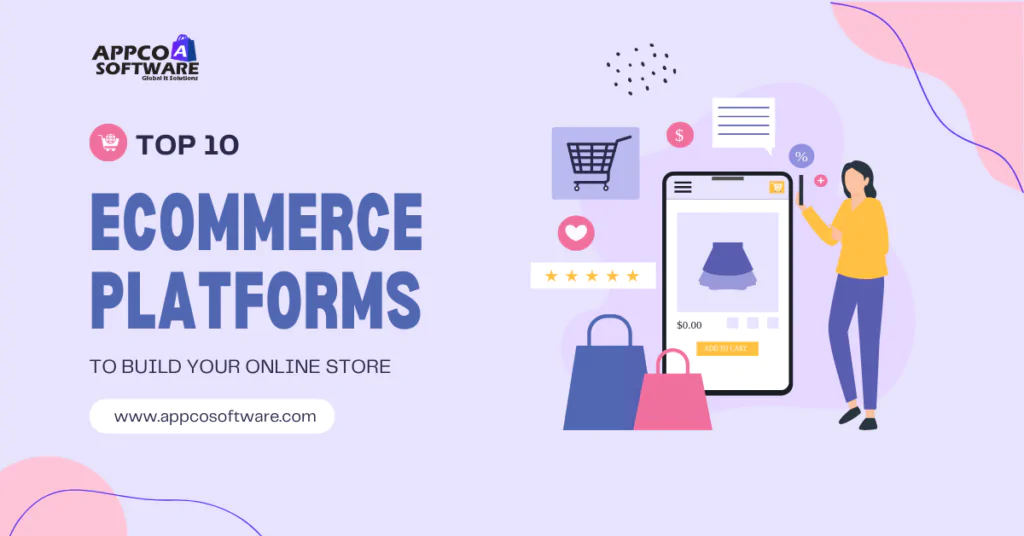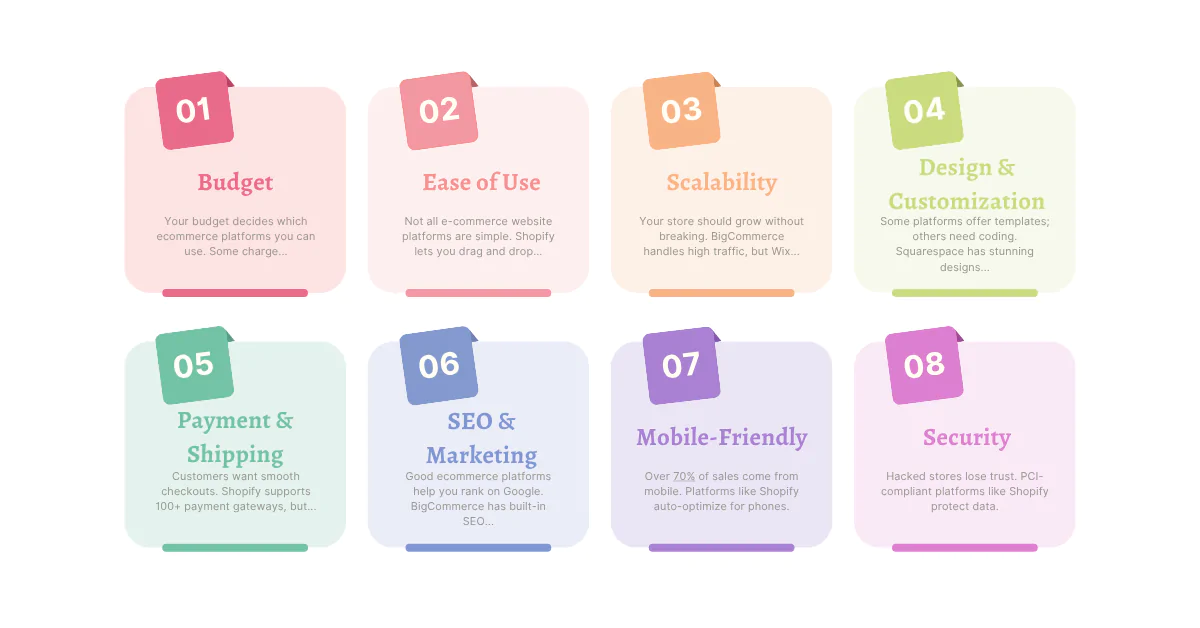The world of online shopping is growing fast. In 2025, over 2.77 billion people are expected to make an online purchase. To start selling online successfully, you need an e-commerce website. But with so many options available, it is difficult for you to pick the finest e-commerce website platform.
Some platforms, like as Shopify, are simple for novices to set up. Others are powerful but need help from a web development company. If you already have a store but want to switch, e-commerce migration services can help move your products and data safely.
This guide compares the top ecommerce platforms so you can decide which fits your business. Whether you need simple tools or advanced e-commerce web development services, we will break it down in simple terms.
By the end, you will know which platform works best for small stores, big brands, or even if you need an e-commerce development company to build a custom solution. Let’s get started.
How to Choose the Best eCommerce Platform?
The success of your internet business depends on your choice of eCommerce platform. Your budget and expansion goals will determine which option is ideal for you. When choosing an eCommerce solution, keep the following important considerations in mind:
1. Budget
Your budget decides which ecommerce platforms you can use. Some charge monthly fees, while others take transaction cuts. Shopify starts at $29/month, but WooCommerce is free, though you pay for hosting. Most small businesses prefer affordable options. If you need custom features, a web development company may cost more.
2. Ease of Use
Not all e-commerce website platforms are simple. Shopify lets you drag and drop, while Magento needs coding. Over 87% of users abandon platforms that are too complex. If you are new, try setting up a Shopify store first. For advanced needs, an e-commerce development agency can help.
3. Scalability
Your store should grow without breaking. BigCommerce handles high traffic, but Wix struggles with large inventories. 30% of businesses switch platforms when they outgrow them. If you plan big, pick scalable e-commerce websites or hire a mobile app development company for upgrades.
4. Design & Customization
Some platforms offer templates; others need coding. Squarespace has stunning designs, while WooCommerce lets you tweak everything. 75% of shoppers judge stores by looks. If you need unique designs, e-commerce web development services can build them.
5. Payment & Shipping
Customers want smooth checkouts. Shopify supports 100+ payment gateways, but some platforms limit options. 50% of cart abandonments happen due to poor payment methods. Ensure your platform integrates with popular processors like PayPal and Stripe.
6. SEO & Marketing
Good ecommerce platforms help you rank on Google. BigCommerce has built-in SEO tools, while others need plugins. 53% of online traffic comes from organic search. If SEO matters, pick a platform with strong marketing features.
7. Mobile-Friendly
Over 70% of sales come from mobile. Platforms like Shopify auto-optimize for phones. If yours doesn’t, a mobile app development company can help.
8. Security
Hacked stores lose trust. PCI-compliant platforms like Shopify protect data. 43% of small businesses face cyberattacks yearly. If security is a concern, use trusted e-commerce website services to switch safely.
Top 10 eCommerce Platforms Compared
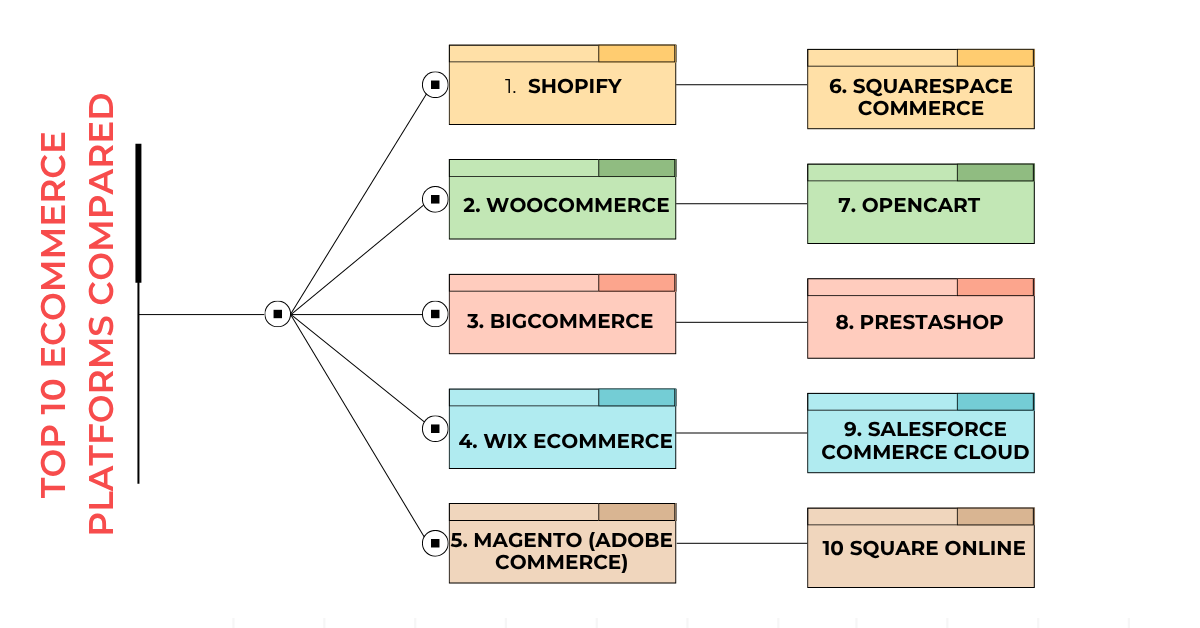
Choosing the right platform can make or break your online store. We’ve analyzed the top 10 options to help you find your perfect match.
1. Shopify
Shopify is one of the most widely used e-commerce platforms. As of 2025, it powers more than 5.23 million online stores. It is intended for novices looking for an easy approach to begin selling products online. With pre-made designs and an intuitive dashboard, setting up a Shopify store only takes a few minutes. Marketing tools, inventory management, and payment processing are all integrated.
The platform scales well for growing businesses. While transaction fees apply (unless using Shopify Payments), the $29/month basic plan covers essentials. For advanced needs, Shopify Plus handles high-volume sales. However, deep customization requires coding or help from a web development company.
Shopify provides a point-of-sale solution for physical retailers and is a master at mobile optimisation. Its marketplace offers more than 8,000 possibilities if you require apps or connections. E-commerce migration services can move Shopify stores to other platforms for companies that seek greater control.
2. WooCommerce
A free WordPress plugin called WooCommerce converts websites into online shops. If you want complete control and already use WordPress, this is perfect. WooCommerce necessitates independent hosting, domain registration, and security setup, in contrast to hosted e-commerce website platforms.
The platform provides significant customisation through plugins and supports an infinite number of goods. Over 30% of all online stores use WooCommerce, making it highly flexible. However, managing updates, security, and performance falls on you. Many businesses hire an e-commerce development company for maintenance.
WooCommerce works well for SEO and integrates with most payment gateways. Since it’s open-source, developers can modify every aspect. But if you lack technical skills, simpler e-commerce websites like Shopify may be better.
3. BigCommerce
BigCommerce is designed for rapidly expanding companies. It has sophisticated capabilities like multi-currency selling and doesn’t impose transaction fees as Shopify does. Large names are among the more than 60,000 stores that use it.
Strong SEO capabilities, integrated analytics, and smooth social media, eBay, and Amazon integrations are all provided by the platform. BigCommerce is a scalable option because it manages heavy traffic well. However, novices may require some time to get used to its more complicated interface compared to Shopify’s.
BigCommerce offers headless commerce options and API access to businesses. If migrating from another platform, e-commerce migration services can ensure a smooth switch. While pricing starts at $29/month, larger businesses may need custom plans.
4. Wix eCommerce
Wix is best for small businesses that prioritize design over advanced features. With its drag-and-drop editor, creating the greatest e-commerce websites is easy and requires no technical knowledge. Wix is used by more than 200,000 online retailers.
Basic selling features like payment processing and inventory tracking are included in the platform. But it isn’t as scalable as BigCommerce or Shopify. Once your store grows, switching to another platform may require e-commerce web development services.
Wix offers beautiful templates but limits third-party integrations. Since Wix doesn’t offer native apps, you may need a mobile app development business if you need a mobile app. With a monthly starting price of $27, it’s inexpensive for entrepreneurs.
5. Magento (Adobe Commerce)
Magento is a powerhouse for large businesses and developers. The open-source version is free, but you’ll need hosting and technical expertise. Adobe Commerce, the paid version, offers cloud hosting and premium support. Over 250,000 merchants use Magento.
The platform handles massive product catalogs and high traffic. There is no end to customisation, but managing it is probably going to require an e-commerce development business. Magento isn’t the best option for novices due to its steep learning curve.
6. Squarespace Commerce
Squarespace is perfect for creative firms because of its reputation for beautiful designs. Squarespace is used by more than 3.7 million websites, not all of which are retailers. You may sell goods, services, and subscriptions with its commerce capabilities. With expert templates, the editor is user-friendly and visually appealing.
In contrast to specialised e-commerce platforms, Squarespace prioritises design. It takes PayPal and Stripe as payment methods and comes with standard selling features like inventory management. Advanced capabilities like abandoned cart retrieval are absent, though. For growing stores, this may require switching platforms later using e-commerce migration services.
Pricing starts at $23/month. While great for small boutiques, businesses needing complex features might prefer Shopify or hire a web development company for custom solutions.
7. OpenCart
OpenCart is a free, open-source platform for those who want full control. It powers over 342,000 online stores worldwide. You’ll need web hosting and technical skills to set it up, similar to WooCommerce.
The platform supports unlimited products and has 13,000+ extensions. However, managing security and updates is your responsibility. Many users hire an e-commerce development company for maintenance. OpenCart works well for small businesses but struggles with high traffic.
If you are migrating from another system, e-commerce web development services can help. While cost-effective, OpenCart requires more effort than hosted solutions like Shopify.
8. PrestaShop
PrestaShop is another open-source option. It is most popular in Europe. Over 250,000 stores use it globally. Like OpenCart, it’s free. But it needs hosting and setup. The platform is lightweight and supports multiple languages and currencies.
PrestaShop has a marketplace with 5,000+ add-ons. However, essential features like payment gateways often require paid modules. For businesses needing help, an app development company can build companion apps.
While flexible, PrestaShop has a learning curve. It’s best for merchants comfortable with technical platforms or those working with developers.
9. Salesforce Commerce Cloud
Salesforce Commerce Cloud is for large enterprises. It offers AI-powered tools, omnichannel selling, and cloud hosting. Major brands like Adidas use it. The platform handles B2B and B2C sales seamlessly. For businesses switching to it, e-commerce migration services are essential due to data complexity. This solution is overkill for small stores but powerful for global brands needing advanced analytics and automation.
10. Square Online
Square Online is best for businesses using Square POS. It offers a free plan (with Square transactions) or paid options starting at $29/month. Over 4 million sellers use Square’s ecosystem.
The platform is simple, with drag-and-drop editing. It syncs with Square’s in-person sales system. This makes it best for brick-and-mortar stores to go online. However, features are limited compared to other e-commerce website platforms.
For growing businesses, upgrading to Shopify or hiring an e-commerce development agency for customization might be necessary later.
Quick Comparison Table: Top eCommerce Platforms
Key Insights:
- Most user-friendly: Shopify, Wix
- Most scalable: Magento, BigCommerce, Salesforce
- Best free options: WooCommerce, OpenCart (but need hosting)
- For physical retailers: Square Online
- Enterprise solutions: Magento, Salesforce
Which eCommerce Platform Should You Choose?
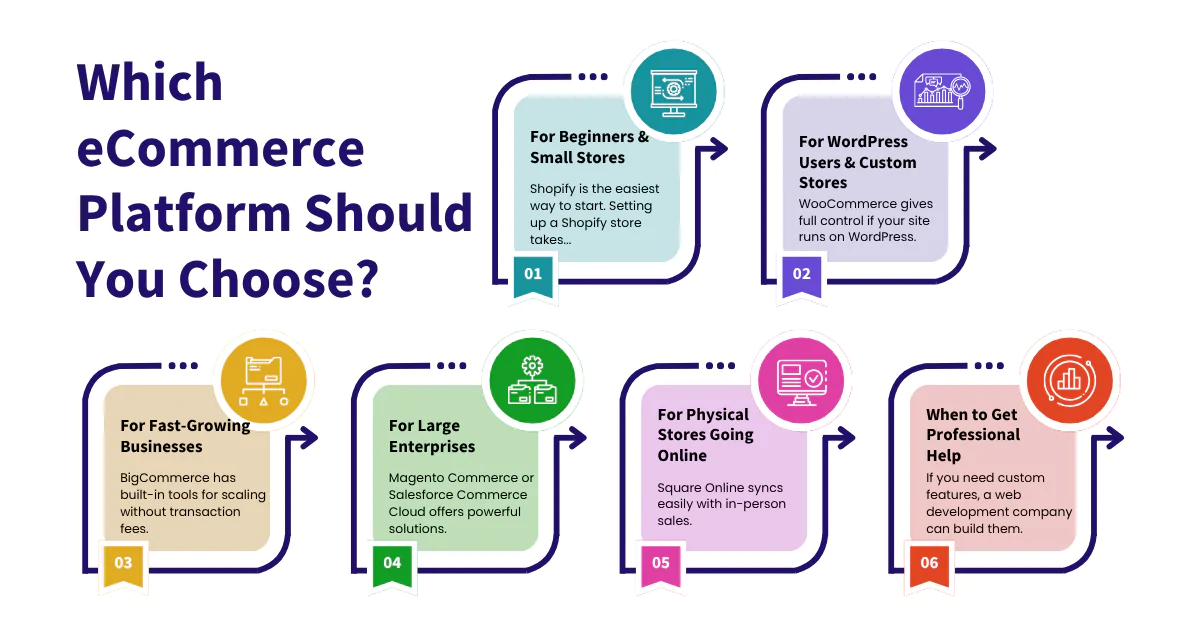
Picking the right ecommerce platform depends on your business needs, budget, and technical skills. Here’s how to decide:
1. For Beginners & Small Stores
- Shopify is the easiest way to start. Setting up a Shopify store takes minutes, and you get everything in one place.
- Wix works if you care more about design than advanced features.
- Square Online fits best if you already use Square for in-person sales.
- These e-commerce website platforms handle hosting and security for you. You won’t need a web development company to get started.
2. For WordPress Users & Custom Stores
- WooCommerce gives full control if your site runs on WordPress.
- You will need to manage hosting, updates, and security. Some businesses hire an e-commerce development company for help.
3. For Fast-Growing Businesses
- BigCommerce has built-in tools for scaling without transaction fees.
- Magento (Open Source) handles large catalogs but needs technical skills. Many use e-commerce web development services to manage it.
4. For Large Enterprises
- Magento Commerce or Salesforce Commerce Cloud offers powerful solutions.
- These require an app development company or an IT team to implement.
5. For Physical Stores Going Online
- Square Online syncs easily with in-person sales.
- Shopify also works well if you need POS integration.
6. When to Get Professional Help
- If you need custom features, a web development company can build them.
- For mobile apps, partner with an app development company.
- Switching platforms? Use e-commerce migration services to move your data safely.
Start simple. Most businesses begin with Shopify or WooCommerce. As you grow, you can switch to more advanced e-commerce websites. The right platform saves time and helps you sell more.
Future Trends in eCommerce Platforms
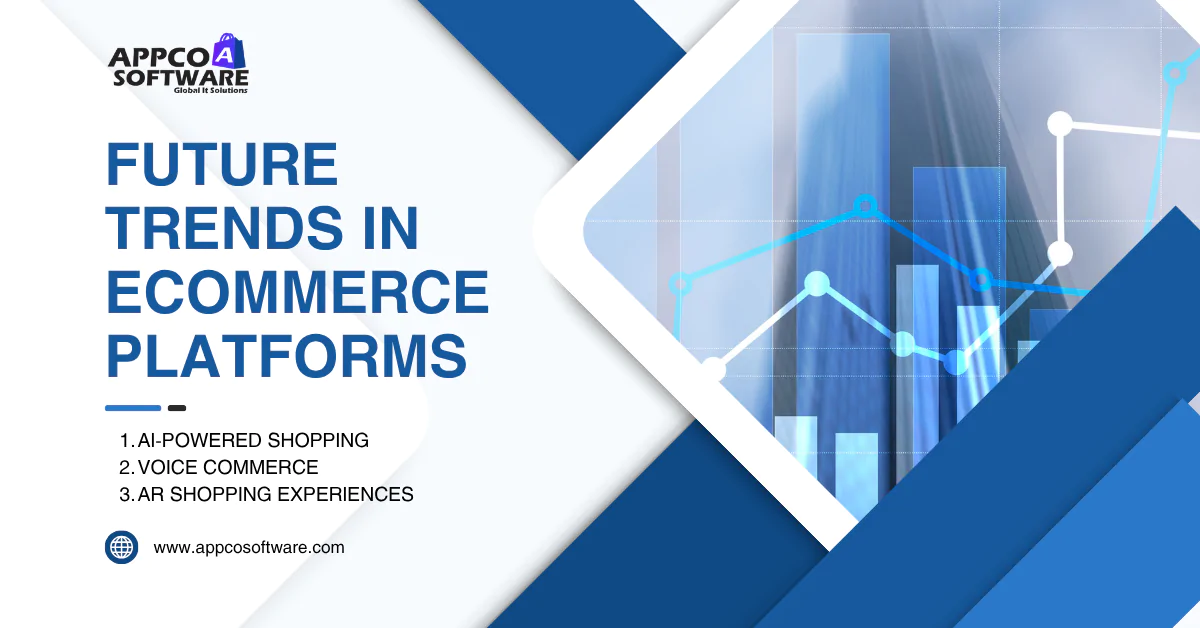
The way people shop online keeps changing. Ecommerce platforms must adapt to stay ahead. Here are three big trends shaping the future of the best e-commerce websites:
1. AI-Powered Shopping
Artificial Intelligence (AI) is changing how ecommerce stores operate online. Chatbots answer customer questions 24/7. AI suggests products based on what shoppers like. Some e-commerce website platforms now use AI to write product descriptions or optimize prices. For store owners, this means less manual work. Platforms like Shopify already offer AI tools. Businesses working with an e-commerce development company can build custom AI features.
2. Voice Commerce
More people use voice assistants like Alexa or Siri to shop. By 2025, over 75% of households will own a smart speaker. Ecommerce platforms need to support voice search. This means optimizing product listings for spoken queries. An app development company can help create voice shopping features for your store.
3. AR Shopping Experiences
Augmented Reality (AR) lets customers “try before they buy.” Furniture stores use AR to show how a sofa looks in a room. Beauty brands let shoppers test makeup virtually. Some best e-commerce websites already offer AR. Shopify has AR tools for product displays. For custom AR features, businesses hire a web development company with AR experience.
What This Means for Store Owners
- Existing stores may need e-commerce migration services to add these features
- New stores should choose ecommerce platforms with future-ready technology
- Complex features might require an e-commerce web development company
These trends make shopping easier for customers. Stores that adopt them early will stand out. Even setting up a Shopify store now can include some of these future technologies.
The key is to start planning. Whether you build simple AI chatbots or full AR experiences, these changes will shape the next generation of online shopping.
Appco Software: Your eCommerce Technology Partner
Appco Software helps businesses build and grow their online stores. As both a web development company and a mobile app development company, they create custom solutions for ecommerce platforms of all sizes.
What Appco Software Offers?
- For store owners setting up a Shopify store, Appco provides theme design and app integrations. They help customize Shopify stores beyond basic templates.
- Businesses using other e-commerce platforms can access:
- E-commerce development services for WooCommerce, Magento, and BigCommerce
- Mobile app development to complement online stores
- E-commerce migration services to switch platforms smoothly
Who Benefits from Appco?
- Startups needing their first best e-commerce websites
- Growing businesses expanding to mobile with a mobile app development company
- Enterprises requiring complex ecommerce platforms with custom features
Technical Expertise
Appco’s team understands both the technical and business sides of eCommerce. They can:
- Build stores from scratch
- Improve existing stores
- Connect stores with inventory and accounting systems
Unlike generic developers, Appco focuses specifically on eCommerce solutions. They stay updated on platform changes and new technologies like AR shopping and AI tools. For businesses needing more than standard templates, an e-commerce development company like Appco provides tailored solutions. They bridge the gap between what platforms offer out of the box and what unique businesses need.
Whether you are launching your first store or scaling an existing one, Appco Software delivers the technical expertise to make your eCommerce vision work. Their solutions help stores sell more while reducing technical headaches.
Conclusion: Finding Your Perfect eCommerce Platform
One of the most crucial choices you will make for your online business is selecting the right e-commerce platform. Shopify and Wix provide the simplest starting points for novices. For greater control, expanding companies may favor WooCommerce or BigCommerce. Big businesses frequently use Salesforce or Magento, although these usually need assistance from an e-commerce development company.
The best e-commerce websites adapt over time. Many start simple, then use e-commerce web development services to upgrade later. If you need mobile features, a mobile app development company can extend your store’s reach.
There’s no single “best” choice among e-commerce website platforms – only what’s best for your business today and tomorrow. Start where you are comfortable, but plan for where you are going.
FAQs
1. What are the best e-commerce websites for beginners?
Shopify and Wix are easiest for starters. They handle hosting and security, so you can focus on selling. It takes less than a day to set up a Shopify store.
2. Do I need a mobile app for my online store?
Not immediately, but apps improve customer experience. A mobile app development company can build one once your store grows.
3. Which ecommerce platforms work best for large businesses?
BigCommerce, Magento, and Salesforce Commerce Cloud handle high sales volumes and complex needs.
4. Can a web development company improve my existing store?
Yes. They can optimize speed and redesign layouts.
5. What’s the biggest mistake when choosing e-commerce platforms?
Picking based only on price. The right platform should grow with your business, not limit it.

